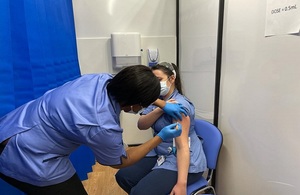Carers urged to get COVID-19 booster now
All unpaid carers, care home and home care workers are urged to get boosted against coronavirus (COVID-19) now to protect the most vulnerable this winter.

-
New study shows boosters significantly reduce the risk of severe COVID-19 infections in care residents
-
All carers and recipients of care offered priority access at vaccine sites
A new study, published today by the University of Birmingham and UCL, adds further evidence to the importance of a booster vaccine for both carers and care home residents as they are encouraged to get boosted now.
The VIVALDI study investigates the immune responses of staff and residents in long-term care homes who received a Pfizer booster vaccine. The results show up to a 12.3-fold increase in antibody response in residents without prior infection following their booster, reducing their risk of severe COVID-19 infections.
Where operationally viable, NHS England has requested vaccination centres offer priority access for frontline staff, including unpaid carers and social care staff, which includes access to queue management and priority lines. This makes it as easy as possible for anyone who is receiving or giving care, whether paid or unpaid, to get their booster this winter.
Staff may be asked to show a valid ID for priority access. Unpaid carers can use a letter issued to the care sector as proof of ID. Sites are also making reasonable adjustments for pregnant women, the clinically vulnerable, including those with learning disabilities and autism and severe mental illness, as well as for their carers.
Minister for Care Gillian Keegan said:
Our fantastic social care workforce have shown time and time again during this pandemic the lengths they will go to deliver high-quality care in the most challenging circumstances – showing true dedication and professionalism – and I can’t thank them enough for all their hard work.
We are calling on them to step up once again to come forward and protect themselves and those around them by getting boosted now, giving those they care for maximum protection over the winter.
We’re all in this together – please play your part.
The study assessed the original COVID-19 strain and the Delta variant. Data published by the UK Health Security Agency shows vaccine effectiveness against symptomatic infection is substantially reduced against Omicron with just 2 doses over time, but a third dose boosts protection back up to over 70%.
99% of older-adult care homes have now been visited to offer booster vaccinations to residents and staff. The final 1% will be visited by 24 December 2021, subject to no further COVID-19 outbreak within those care homes. However, uptake is lower among staff with only 34% of staff and 30% of staff in younger adult care homes having taken up the offer by mid-December and all are asked to come forward as soon as possible.
Appointments continue to be available over the festive period and every eligible adult can now book their jab online. Given some sites remain busy, the NHS is encouraging people to book to guarantee their slot.
The government recently announced £388 million of funding up to 31 March 2022 to support the care sector to put in place infection prevention and control measures over the winter period, including to increase COVID-19 and flu vaccine uptake among staff.
More than two-thirds of people aged 18 and over who are eligible have now received a booster, with over 29 million boosters administered.
Vaccination sites have been asked to operate 12 hours a day, 7 days a week wherever possible and in every community there should be slots available at least 16 hours a day – with some sites extending to 24-hour operation to make it easier for people who work shift patterns.